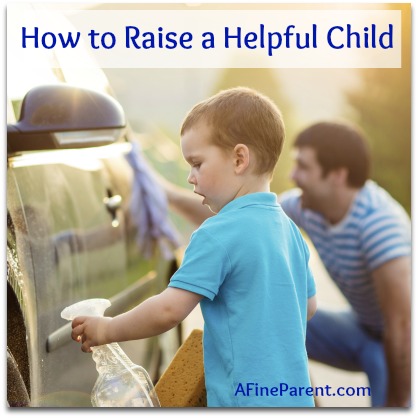 “Bam!” The door has just, yet again, shut in my face.
“Bam!” The door has just, yet again, shut in my face.
This is not a metaphor. The door literally just shut in my face.
I was out with my children. And, as kids usually do, my son ran ahead, eager to lead the way. But, just as quickly as he barged through a door ahead of us, he hardly glanced back as he let the door shut in my face.
We’ve all been through it.
We bristle and wonder how we’re managing to raise our children to be so thoughtless and rude. To become the very type of person we don’t want them to be.
We want our children to demonstrate empathy for others. We want our kids to be the light of helpfulness in a world that sometimes feels dark with selfishness. But how do we do that?
On a recent trip to the grocery store, I anticipated a shopping experience that would prove my kids to be sorely lacking in the helpfulness gene. I prepared for a trip that would include the normal bickering and complaints between my kids, and a desperate attempt to gather all the goods I needed as quickly as possible so we could get out of there before making too much of a scene.
I made a plan in my head of exactly how we would tackle this store. After all, who knew how long the kids would last? Who knew if the baby would have a meltdown in aisle 6? Who knew if (or, more accurately, when) my newly potty-trained daughter would need to urgently use the restroom?
And, who knew if the kids would be a help or a hindrance?
But, as we entered the store, my nerves calmed.
My oldest son grabbed a shopping cart before I even had to ask and wheeled it toward me as I pushed my baby in his stroller toward the entrance.
My daughter eyed up the mini-shopping cart – the one with the flag that boasts, “Shopper in training!” – and asked, “Mommy, can I push that one? Can I put the food in there for you?”
“Absolutely,” I nodded as I led us into the store. This might not be so bad after all.
We paraded in, one after the other, and, besides my “helpers” accidentally hitting their carts into the back heels of some strangers, and at least more than one item falling out of my daughter’s tiny cart, the shopping trip wasn’t a complete disaster. Because my kids helped.
They eagerly grabbed items as I pointed them out, entertained their baby brother when he got fussy, and excitedly took turns placing items on the conveyor belt as we checked out (what kid wouldn’t love that?). They bagged groceries, piled them into the car, and even returned the shopping carts to the corral (which was located safely beside our car).
As we drove home, I lauded them on their helpfulness and thought about how we got here. I mean, they weren’t always so helpful. Heck, we got to the store later than I’d wanted to because I’d had to beg them far too many times to get their shoes on.
Still, despite such moments, my kids usually do help. Sure, they might need a little prodding now and then (“Mommy, can I finish playing my game first?”), and they might complain a bit or be a bit too begrudging (“Fine…I’ll do it…if I have to.”) But, they are often content to help out.
As I drove home from the store, I wondered, how did we get here? In thinking back on it, I came up with a list of ways on How to Raise a Helper.
Start Young
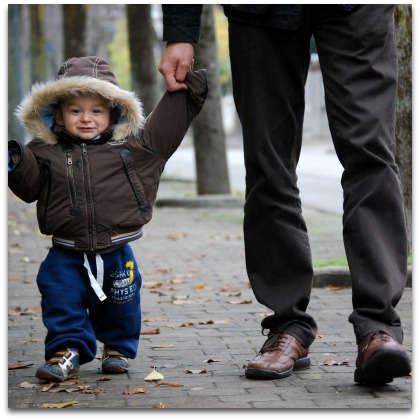 I’ve been urging my kids to be helpful since they were toddlers. Even without my encouragement, however, they naturally showed a tendency to want to be of assistance. I see it now in my 11 month-old, who, as I feed him, adorably picks up pieces of his scrambled eggs and attempts to feed me in return.
I’ve been urging my kids to be helpful since they were toddlers. Even without my encouragement, however, they naturally showed a tendency to want to be of assistance. I see it now in my 11 month-old, who, as I feed him, adorably picks up pieces of his scrambled eggs and attempts to feed me in return.
Indeed, in a study conducted by Felix Warneken and Michael Tomasello, of The Max Planck Institute for Evolutionary Anthropology, babies as young as 14 months old demonstrated a natural desire to be helpful to others. Children, it seems, have an innate sense of empathy. Still, it is up to us, as their parents, to fan the flame of helpfulness in our children in order to keep that altruistic desire burning.
In my own family, my husband and I give our kids, from babyhood on, chances to help. When I pile books back on the shelf, my 11 month-old tries, in vain, to put the books back, too. I hand him more books, and he keeps on trying. When I put balls back in their bin, I’ll hand one to him, and he’ll crawl up next to me, place it in the bin and look at me with a proud smile.
Set an Example
Be helpful yourself. Studies show that children (of all ages) who witness their parents helping others are more likely to be helpful, too.
So, seek ways you can go out of your way to help others, especially when you know your children are watching. When you’re asked to assist someone, say yes when you can. When you notice someone in need, go out of your way to be of assistance.
We all know children imitate what they see their parents doing, so why not give them selfless, thoughtful qualities to imitate.
Point Out Ways that Others are Helpful
My kids aren’t perfect. On more than one occasion, when I’ve asked them for help, I’ve heard them answer, “But, I didn’t make that mess.”
I promptly remind them that I don’t make most of the messes in the house, but that I still clean them up anyway. I may get some huffs and deep sighs, but they usually stop complaining and start helping.
Or, when we’re out, I point out the ways I see others being helpful. I might remark on how kind a person who holds the door for us is. Or what a thoughtful thing it was when someone picked up an object my baby dropped.
By complimenting helpfulness, children see that it is something their parents value, and something that really is still valued in our society.
Make it Fun
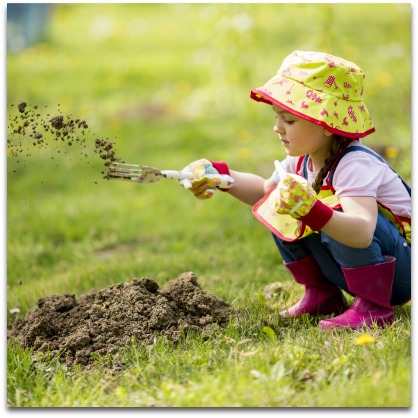 My kids have fun making games out of clean-up time. They toss soft blocks into their bag as if the bag is a basket and the blocks are the basketball. Then, they cheer when they “score” as if they’ve just made a three-pointer in a big game.
My kids have fun making games out of clean-up time. They toss soft blocks into their bag as if the bag is a basket and the blocks are the basketball. Then, they cheer when they “score” as if they’ve just made a three-pointer in a big game.
Other times, we’ll make something that might otherwise be a drudgery into friendly competition. The dreaded chore instantly becomes fun, and the kids who’d been resisting are suddenly eager to partake in the game.
If you have multiple children helping to clean up, for instance, tell them it’s time to see who can pick up more blocks. Or, if you have one child, tell her you’ll time her on how quickly she can put her toys away. It’s amazing how saying, “Ready, set, go!” can get a kid to do just about anything.
Offer Choices
In a study conducted by Nadia Chernyak and Tamar Kushnir, of Cornell University, it was found that giving kids choices increases altruistic behaviors.
I’m not surprised by the findings. In my own home, I’ve discovered the same. My children hardly ever respond favorably when dictated to; but, when choices are given, they are happy (or, at least, happier) to pick an option.
For instance, if the house is a mess, I’ll list for the children the things that need doing (i.e. “Find any clothes left on the floor and put them in the hamper. Or, you can take all the dirty dishes to the sink.”)
Then, I’ll let them choose which one they want to help with. Sometimes, they pick the same task and work on it together. Other times, they decide to go solo. Either way, they’re part of a team that is our family, and they’re pitching in for a common goal.
Suggest Specific Tasks they can Handle
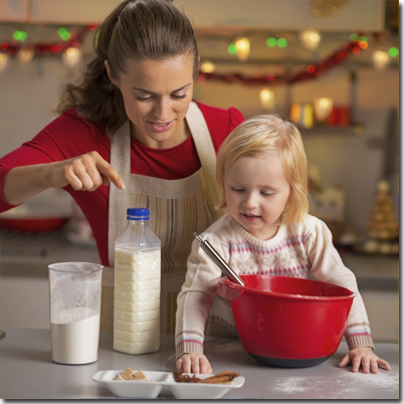 Not surprisingly, I have different expectations for my 4 year-old than I do my 9 year-old when it comes to many things in life. The same holds true for helpfulness.
Not surprisingly, I have different expectations for my 4 year-old than I do my 9 year-old when it comes to many things in life. The same holds true for helpfulness.
If I ask either child to “clean up the living room,” more often than not, nothing gets done. But, if I ask my son to organize his Legos or my daughter to put her dolls away, both kids are more likely get right to task.
An entire room can be overwhelming. A small job with which they’re familiar is doable.
Give Time Limits when Needed
If my kids get distracted or off task (as my daughter typically does when cleaning up her toys…they’re just too darn tempting to play with!), then I’ll give them some awareness of how much time I expect them to be able to complete their task in.
Sometimes, I might set a timer. Other times, I’ll continually rattle off times (“It’s been five minutes. How much did you get done?”) to keep them aware of their progress.
If they’re too young to understand a strict concept of time, I might put on a song they’re familiar with (“Let it Go,” anyone?) and challenge them to see how much of their task they can get done before the song is over.
Offer Incentives
One of the most effective ways to keep my kids motivated to help out is to encourage them with some sort of end goal. This is not a tangible reward, mind you, as studies have shown that such rewards may actually decrease altruism in children.
Instead, I prompt them with some sort of fun activity we can do together once our work is done.
For instance, I might urge them to keep going by reminding them that once they finish helping to clean up the kitchen, we can finally leave for the park.
Sometimes, it’s incentive enough to remind them that “many hands make little work,” and that the more we all pitch in, the faster we can get back to playtime!
Accept Their Offers of Help
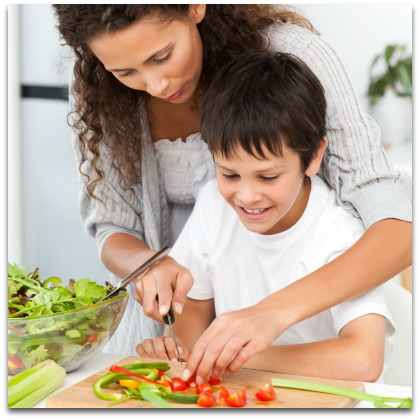 I know. When you’re in a rush and trying to get dinner in the oven, it’s not really the time you want to hear your two year-old say, “Mommy, I help?” It’s so tempting to redirect that little one to some toys and get back to business in the kitchen.
I know. When you’re in a rush and trying to get dinner in the oven, it’s not really the time you want to hear your two year-old say, “Mommy, I help?” It’s so tempting to redirect that little one to some toys and get back to business in the kitchen.
But, this is the perfect time to teach your child that helpfulness is always welcome. Even in the moments when you don’t really feel like it is. Try – just try – to find a way that your eager toddler can be of service.
My daughter always wanted to help with the laundry. Often, I tried to change loads in a rush, but she wanted to do the job with me.
So, I’d set up her step stool and hand her the clothes to toss into the washer. Or, I’d have her pick out all the reds from the hamper. Even if I wasn’t doing reds just then (what she didn’t know didn’t hurt her). Even little tasks make kids feel like a big help.
The most important benefit, though, of taking your children up on their desire to do something for you is that in doing so, you build their confidence.
As a slight control-freak, I’ve found it difficult to make sure I’m including my children in helpful tasks. When one of my little ones excitedly asks to help, and I’m running late, it’s easy to say, “No, thanks, I’ve got it.”
Unfortunately, I’ve done that on more than one occasion and watched as my child’s face dissolved into disappointment. I’ve witnessed my children go from sheer joy at the prospect of being deemed capable of helping with my “big people” jobs to utter discouragement at my assessment that they’re not so capable after all.
When our children offer us help, we have the opportunity to encourage or discourage their self-confidence. We have the chance to build them up by sending them the message that we believe in their ability to handle a particular task, or tear them down by letting them know that we deem them not up for the challenge.
Since young children naturally exhibit desires to be kind to others, don’t quash this desire by turning your kids’ offers of help away. Take them up on it, and they’ll confidently keep coming back to see how else they can do some good.
Give Praise when Praise is Due
 When my kids help, I thank them. When they help without complaining, I recognize them for doing so. When they help without being asked, I probably get a bit too excited. But, they love it. And they want to do it again.
When my kids help, I thank them. When they help without complaining, I recognize them for doing so. When they help without being asked, I probably get a bit too excited. But, they love it. And they want to do it again.
Just be careful with your praise so as not to have it backfire. Psychologists Jennifer Henderlong Corpus and Mark Lepper analyzed over 30 years of studies on the effects of praise, and noted that children respond best to sincere praise that specifies what, in particular, you are proud of.
So, try to avoid spouting, “Way to go!” when your 10 year-old Windexes the sliding doors. Instead, say, “Thanks for cleaning the window. That helped me a lot.”
Save the gushing for your younger ones, who, the psychologists say, are less likely to respond negatively to inflated praise.
2-Minute Action Plan for Fine Parents
For our quick contemplation questions today, let’s try these –
What is one thing that your kids could help with today? Look for one small thing they can do. Start small. Don’t go from zero to sixty in a day, expecting your kids to go from barely lifting a finger to cleaning up after every meal and every playtime. That’s the quickest way to overwhelm them and cause them to shut down.
When do they ask if they can help you? Are you cooking? Cleaning? Folding laundry? Come up with a plan that includes them the next time you are doing this task.
Consider if there are any areas where you need your children to become more helpful themselves. Maybe it’s as simple as setting the table for dinner. Or hanging up their coat and putting their shoes away as soon as they get in the door. Whatever it is, list a few small tasks that you’d like your children to do, and let them pick the one they want to make a regular habit first.
What other techniques have you found effective in raising helpers? We’d love to read about them in the comments below!
Long-Term Action Plan for Fine Parents
For the long haul, make your home one of helpfulness. Have the adults in your home get on the same page with making an extra effort to model altruism for your children.
Go out of your way not to complain when you do these things. Instead, show your children, by example, that assisting others is an act of kindness. Show them, through your own actions, that we can – and should – find joy in helping others.
Observe your children in action. Keep a mental note of how often they’re helpers and how often they’re not when they could be. You may discover that your kids are more helpful than you thought they were.
After discerning where you are in raising helpful kids, consider how you got here. Do you already implement some of these suggestions? How have they worked for you?
Practice offering meaningful praise when they help out (i.e. “Thank you. I didn’t even ask you to do that. That was rather thoughtful.”) Keep an eye out for ways they’re helpful; try to catch them in the act so you can let them know of your appreciation.
As you work to develop helpfulness as a natural trait inside your home, work, as well, to do so outside the home. Show your children that helpfulness is a part of life, always and everywhere.
What a delightful thing to come across! I insist people to take notes from this article and apply the same in their life. Handling babies and raising them right is a tough task. I wish every child is raised to be a great human being.Good sharing.
I love how to raise a helpful child reading this article made me all warm and fuzzy inside LOL but seriously teaching kids self worth and how to help others as well as themselves is it treasure it will help them succeed and be happy in life it teaches them love
I’m glad you enjoyed the article, Brittany, and thank you for your comment. You’re spot on…it all boils down to love!
My friend has a son and has had this question for a long time. Maybe I will tell him to read this article. I’d be helpful.
I hope your friend finds the article helpful, Susan. Thanks for your comment and for passing it on!